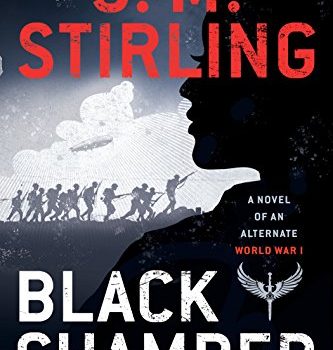Liz Bourke reviews Black Chamber by S.M. Stirling
 Black Chamber, S.M. Stirling (Ace 978-0399586231, $16.00, 400pp, tp). July 2018.
Black Chamber, S.M. Stirling (Ace 978-0399586231, $16.00, 400pp, tp). July 2018.
I’ll confess I wasn’t expecting as many good things from S.M. Stirling’s Black Chamber as I actually found. I have a peculiar relationship with Stirling’s novels. I’ve read quite a few of them, starting with Island in the Sea of Time, and I liked them quite a bit more before I encountered the author on the internet, explaining history to me. Now when I read his (alt) history exposition, I can’t help but feel slightly condescended to all over again. Fortunately, Black Chamber is a rattlingly good spy thriller set in an alternate First World War; unfortunately, its political background (that Theodore Roosevelt won another presidential term due to the unexpected demise of an opponent, has conquered Mexico for its own good, and is essentially in President-for-Life territory) leaves me as unsettled as the main plot – which involves the deployment of chemical weapons against civilian populations.
As I grow older, I grow less and less comfortable with positive depictions of cults of personality and with alternate histories that take the excuse to make the powerful countries of our history even more powerful and equally (or perhaps more) unethical. The difference between a work like Nisi Shawl’s Everfair, which does not assume the inherent rightness of (for example) America or Britain, and the majority of alternate history novels is vast: many alternate history novels are as much power fantasies as superhero stories are – power fantasies for the already powerful. Black Chamber has a steep hill to climb to get me to stop eyeing its background American power-fantasy sideways, even if its main characters and nested betrayals are very compelling indeed.
Luz O’Malley Aróstegui is the daughter of an Irish engineer and a descendant of aristocratic New World Spanish settlers. Her family was close to Theodore Roosevelt before they were murdered, and Luz grew up to get her revenge and become one of a handful of female agents for the Black Chamber, Roosevelt’s intelligence and wetwork agency. Luz is a very efficient spy and killer, as well as a very effective one, and now, in 1916, she’s called up to impersonate an aristocratic Mexican revolutionary called Elisa Carmody and travel with a German agent to Europe in order to find out what new weapon or offensive is going to be directed against England or against the USA, when it finally enters the war.
Luz uses all the tools at her disposal to get close to Horst, the German agent, including his attraction to her. Their journey (by dirigible) to Europe is hardly smooth, thanks to the interest of British and French intelligence agencies – and Luz can’t very well tell them that she’s on their side. But an explosive set of murders, a train journey in the Netherlands that ends in a shootout, and an escape across international borders confirms her bona fides to Horst, if not, quite, to his superior, Colonel Nicolai. When Horst and Luz reach the remote enclave in Germany where the new offensive is being planned, Nicolai confronts Luz with a young woman who’d met the woman she’s pretending to be: Ciara Whelan, Boston-Irish, who joined the Irish revolutionary movement after her brother died and found herself in over her head. Instead of betraying Luz to the German authorities, Ciara confirms that she is who she says she is – and aligns herself with Luz in the hope that Luz a) knows what she’s doing and b) will be able to get them both out of there alive and with the knowledge of the Germans’ horrific new weapon and their plans to deploy it. Ciara, it turns out, finds that her notional attachment to Irish republican aspirations pales beside an actual threat to her American home.
Luz is…working on getting them both home alive, though that has to take second place to getting her hands on the information and getting the information back to the States. To her surprise, she finds herself liking Ciara as a person and feeling – as much as her task allows – protective of her, a liking that develops into attraction that Luz refuses to act on until they are both safe and out of trouble. Ciara’s a geek about electrical things, is competent in her field as Luz is in her own, and their mutual respect and different talents let them work well as a team.
This is a novel with midnight roof-clambering to access heavily guarded offices, submarines delivering payloads of chemical rockets, betrayal, murder, secrets, and sex. Luz is a compelling character. Stirling writes her as a complex person, full of seeming contradictions – and complete badassery: Luz is someone with whom one fucks at one’s own extreme peril. Ciara is also appealing and compelling, part naivety and part iron-hard determination. Even Horst, the German officer who believes in doing his duty for his country even though it demands ugly sacrifices of him – like the mass murder of civilians – is an interesting character.
Stirling’s written a fast-paced, hectic adventure of a thriller. I wish the alternate history he set it in didn’t leave me so uneasy: it’s all fine and well for Americans to enjoy the fantasy of a history where their nation is even more dominant than it already was, but empires are painful, messy things, and some of us come from places where the effects of them are living memory. I wish I could enjoy this novel wholeheartedly. The problem is, emotionally, Black Chamber wanted me to see Luz as one of the good guys. I’m not really convinced that anything separates her (and her bosses) from their opponents but the circumstance of who discovered better ways to mass-murder first.
Liz Bourke is a cranky queer person who reads books. She holds a Ph.D in Classics from Trinity College, Dublin. Her first book, Sleeping With Monsters, a collection of reviews and criticism, is out now from Aqueduct Press. Find her at her blog, her Patreon, or Twitter. She supports the work of the Irish Refugee Council and the Abortion Rights Campaign.
This review and more like it in the June 2018 issue of Locus.
 While you are here, please take a moment to support Locus with a one-time or recurring donation. We rely on reader donations to keep the magazine and site going, and would like to keep the site paywall free, but WE NEED YOUR FINANCIAL SUPPORT to continue quality coverage of the science fiction and fantasy field.
While you are here, please take a moment to support Locus with a one-time or recurring donation. We rely on reader donations to keep the magazine and site going, and would like to keep the site paywall free, but WE NEED YOUR FINANCIAL SUPPORT to continue quality coverage of the science fiction and fantasy field.







This is an acutely perceptive and fair review. Granted, it’s difficult -not- to think that about a mostly favorable review of one’s own work, but given the reviewer’s openly stated attitude, it says a good deal for her honesty and analytical skills.
I might point out that the political and social evolution of the United States under Roosevelt and his New Nationalists/Progressives is -supposed- to be deeply ambiguous and I -wanted- it to make people feel uneasy, but that’s a quibble and in any case those parts seem to have worked as designed.
I’ve enjoyed several books I bought because of Bourke’s reviews, and this one helps demonstrate why.